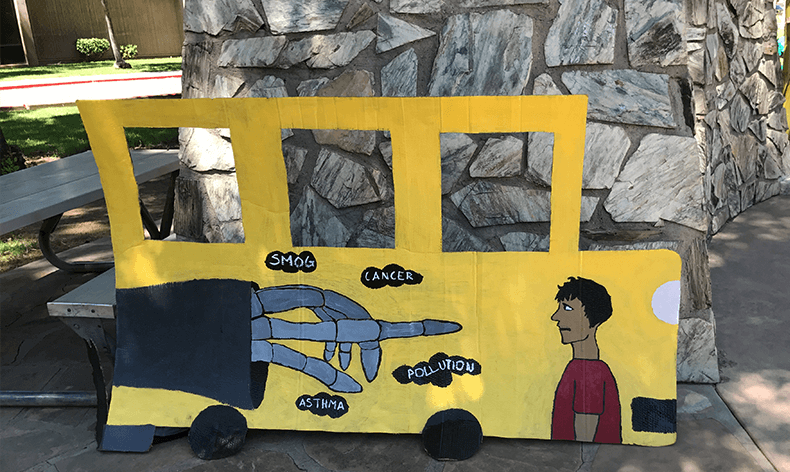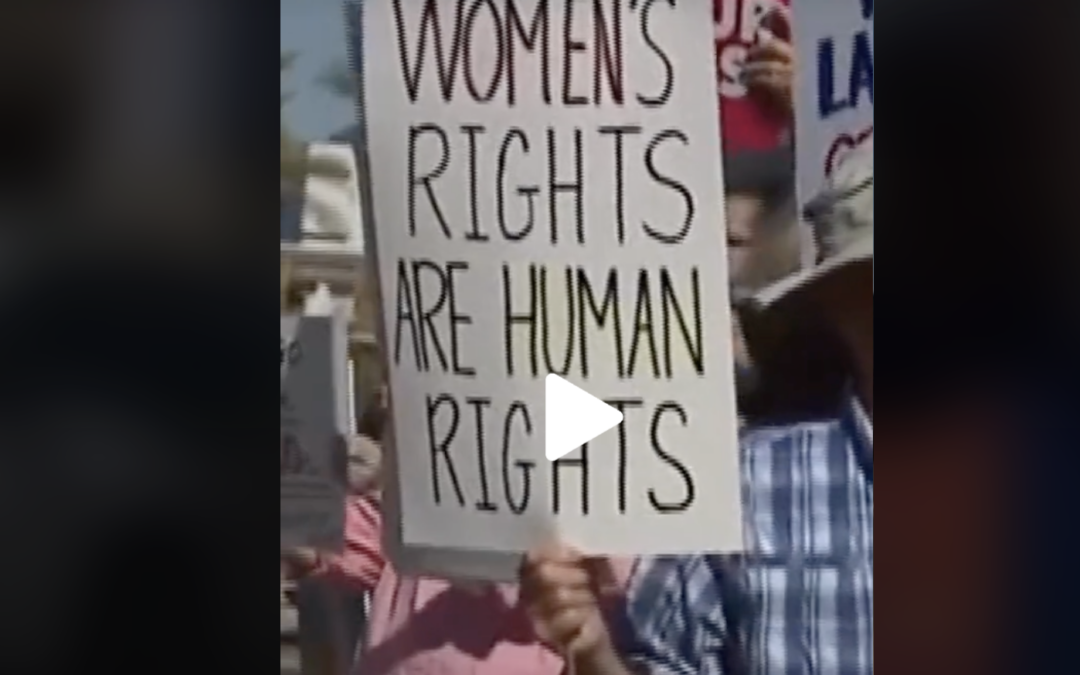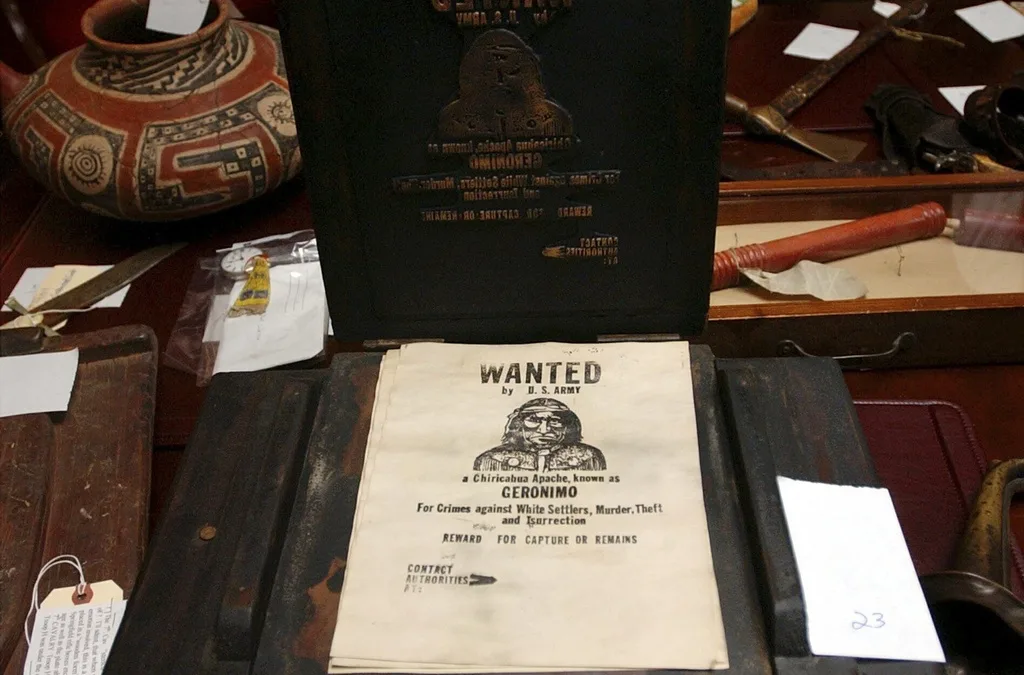
A cardboard bus made by Chispa volunteers shows the harmful effects of vehicle emissions. Photo by Samantha Pouls, Cronkite News.
With state policy favoring fossil fuel, Phoenix partnered with the EPA to replace some of the city’s gas guzzling trucks for low-emission vehicles.
The city of Phoenix announced plans last week to replace 10 city-owned diesel trucks with alternative fuel vehicles through the help of a federal grant.
The $1 million needed to replace the trucks comes from the Environmental Protection Agency’s Cleaner Trucks Initiative. The program launched in 2018 as a way to reduce emissions put out by heavy-duty vehicles throughout the country.
At a news conference on Jan. 30 to announce the rollout of the new vehicles, Phoenix Mayor Kate Gallego joined other city officials and Mike Stoker, administrator for the U.S. Environmental Protection Agency (EPA) Southwest Region.
“Through this initiative, we will modernize heavy-duty truck engines, improving their efficiency and reducing their emissions, which will lead to a healthier environment,” said Stoker. “We all want cleaner air, and the big takeaway is one of the huge areas that we can get cleaner air from is with clean trucks.”
Eyes to a healthier future
Overall, the city plans to replace nine of its solid waste trucks by 2021, leaving only 88 of its 250 solid waste trucks running on diesel. The tenth purchase will be for a long-haul vehicle. The change is expected to reduce the city’s diesel fuel usage by 75,000 gallons every year and reduce annual nitrogen oxide emissions by 1.8 tons.
“Clean air is essential to the well-being of Phoenix’s residents and visitors, and paramount to our continued success,” Gallego said at the event. “As the fifth-largest and fastest-growing city in the nation, we must set a strong example in reducing emissions. We are proud to partner with the EPA in our effort to reduce our city’s fleet emissions and educate other communities on the importance of a cleaner future.”
Gallego also said the city’s efforts to transition to more fuel-efficient vehicles are part of a larger push to reduce overall pollution in Phoenix. The American Lung Association ranked Phoenix as having the seventh-worst ozone pollution out of any city in the country in 2019, sparking calls for change throughout the city.
Going electric
Among those pushing for ways to reduce pollution is a group of high school students at South Mountain High School. They are working with Chispa, a group that works for environmental reform within Latino communities, and petitioned the Phoenix Union High School District to purchase an electric school bus. The school board unanimously approved the purchase last April, and are treating it as an electric bus pilot program.
“We attended every school meeting because we care about our health, our community, and our environment,” South Mountain High School student Monica Acves said in a statement put out by Chispa. “Air pollution and climate change disproportionately impact my family and everyday life. I’m happy to see our district lead by example.”
The electric bus made its debut on the streets of Phoenix in mid-January – the first of its kind in the entire state, according to Chispa. But while the district hopes the pilot program will pave the way for more electric buses, school bus funding from the state continues to favor diesel.
Settling for diesel
Currently, Arizona is in the process of spending $57 million it was awarded in 2016 as part of a settlement between Volkswagen and the Department of Justice for cheating on emissions standards on new school buses. The settlement provided a total of $2.7 billion for distribution throughout all 50 states.
Gov. Doug Ducey earmarked $36 million of Arizona’s share to create the Lower-Emission School Bus Program. Schools could apply to receive either $110,000 to buy a diesel bus or $135,000 to purchase an alternative fuel school bus. If the bus cost was more than what was awarded, schools were required to pay the difference out of the district’s budget.
Only 21 of the 332 buses planned for purchase through the program run on alternative fuel; the rest rely on diesel. Diane Brown, executive director of the Arizona PIRG Education Fund (APEF), believes the program failed to properly incentivize purchasing alternative fuel options, leaving schools to apply for diesel buses as the more budget-friendly option.
“The VW settlement money presented our state with a unique chance to accelerate electrification of school and transit buses, and to invest in electric vehicle charging infrastructure,” Brown said in a statement. “Instead, Arizona steered away from the opportunity to boost transportation electrification by spending VW settlement money on new diesel buses to replace older diesel buses.”
Phoenix takes the reins of environmental change
APEF, the non-profit branch of public interest group Arizona PIRG, ranked all states on how they used their portion of the Volkswagen settlement. The group looked at whether or not the states used the money on diesel vehicles, if states prioritized electric or alternative fuel vehicles, and if charging infrastructure was eligible for funding. Arizona was one of 14 states given an F – the lowest ranking.
Overall, Arizona will be putting only about $2.85 million from the settlement towards alternative fuel buses. This puts the state’s investment into non-diesel vehicles only slightly ahead of Phoenix’s, and Gallego says she’s already working on reducing the city’s stock of diesel trucks even further.
“We’re very proud of the leadership role we’re playing as the city of Phoenix,” Gallego told the Arizona Republic. “So we are looking at all of the city’s programs and trying to lead the way.”
Politics

VIDEO: Hundreds show up in Scottsdale to support reproductive rights
@coppercourier Days after the Arizona Supreme Court ruled to enforce a long-dormant law that bans nearly all abortions, hundreds took part in a...

The Civil War raged and fortune-seekers hunted for gold. This era produced Arizona’s abortion ban
Arizona's 1864 code elaborately describes restrictions on duels, ruling any person involved in the fighting of a duel would be imprisoned for one to...
Local News

It’s official: Your boss has to give you time off to recover from childbirth or get an abortion
Originally published by The 19th In what could be a groundbreaking shift in American workplaces, most employees across the country will now have...

Trump says he’s pro-worker. His record says otherwise.
During his time on the campaign trail, Donald Trump has sought to refashion his record and image as being a pro-worker candidate—one that wants to...





